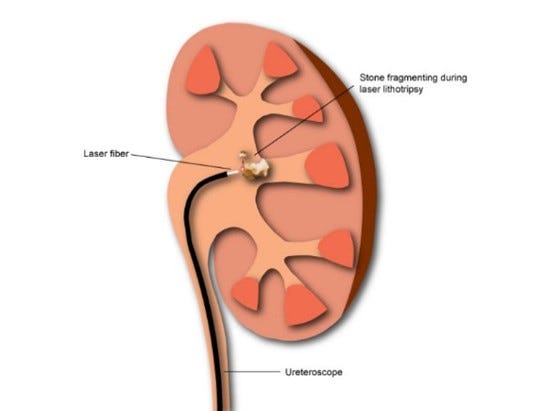Laser kidney stone treatment, also known as laser lithotripsy, is a minimally invasive procedure used to break down kidney stones into smaller fragments that can pass out of the urinary tract more easily. This treatment option is particularly effective for stones located in the kidney or upper urinary tract.

Formation of Kidney Stones: Kidney stones develop when substances in the urine (such as calcium, oxalate, and uric acid) crystallize and form solid masses within the kidney or urinary tract. These stones can vary in size, ranging from as small as a grain of sand to larger stones that can cause significant pain and obstruction.
Indications for Laser Kidney Stone Treatment: Laser lithotripsy is typically recommended in the following situations:
- Large Stones: Stones that are too large to pass on their own or through other non-invasive treatments.
- Location: Stones located in the kidney or upper urinary tract (ureter) where they may cause blockages or pain.
- Composition: Stones composed of calcium oxalate, calcium phosphate, or uric acid that are resistant to fragmentation using other methods.
Procedure Overview:
- Preparation: Before the procedure, imaging studies such as ultrasound or CT scan may be performed to locate and assess the size of the kidney stone.
- Anesthesia: Laser kidney stone treatment is typically performed under general anesthesia or spinal anesthesia, depending on the patient’s condition and preferences.
- Insertion of Scope: A thin, flexible tube with a camera (ureteroscopy) is inserted through the urethra and advanced into the urinary tract until it reaches the kidney or ureter where the stone is located.
- Fragmentation with Laser: Once the stone is visualized, a laser fiber is inserted through the scope. The laser emits bursts of energy that are directed at the kidney stone, breaking it into smaller pieces.
- Removal of Fragments: After fragmentation, the smaller stone fragments are either extracted using a basket-like device inserted through the scope or allowed to pass naturally through the urinary tract.
- Post-procedure Care: Patients are monitored closely after the procedure for any complications, and pain medications or antibiotics may be prescribed as needed. Fluid intake is encouraged to help flush out the stone fragments.
Benefits of Laser Kidney Stone Treatment:
- Minimally Invasive: Unlike traditional surgery, laser lithotripsy does not require large incisions, reducing recovery time and risk of complications.
- High Success Rate: Laser treatment is highly effective in breaking down kidney stones, often allowing patients to pass the fragments without further intervention.
- Preservation of Kidney Function: By removing or reducing the size of kidney stones, laser lithotripsy helps maintain kidney function and prevent further complications.
Considerations:
- Stone Size and Location: Laser treatment is generally suitable for smaller to moderate-sized stones and those located in accessible parts of the urinary tract.
- Follow-up: Patients may require follow-up imaging or urine tests to ensure all stone fragments have been eliminated and to monitor for recurrence.
In conclusion, laser kidney stone treatment is a valuable and effective option for managing kidney stones, offering patients a minimally invasive approach to alleviate symptoms, prevent complications, and improve overall urinary tract health. It is essential for patients to consult with their healthcare provider to determine the most appropriate treatment based on individual circumstances and stone characteristics.
Comments
Post a Comment